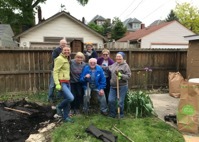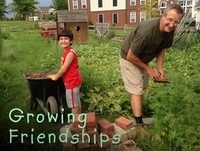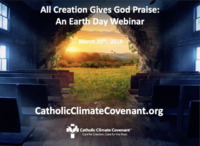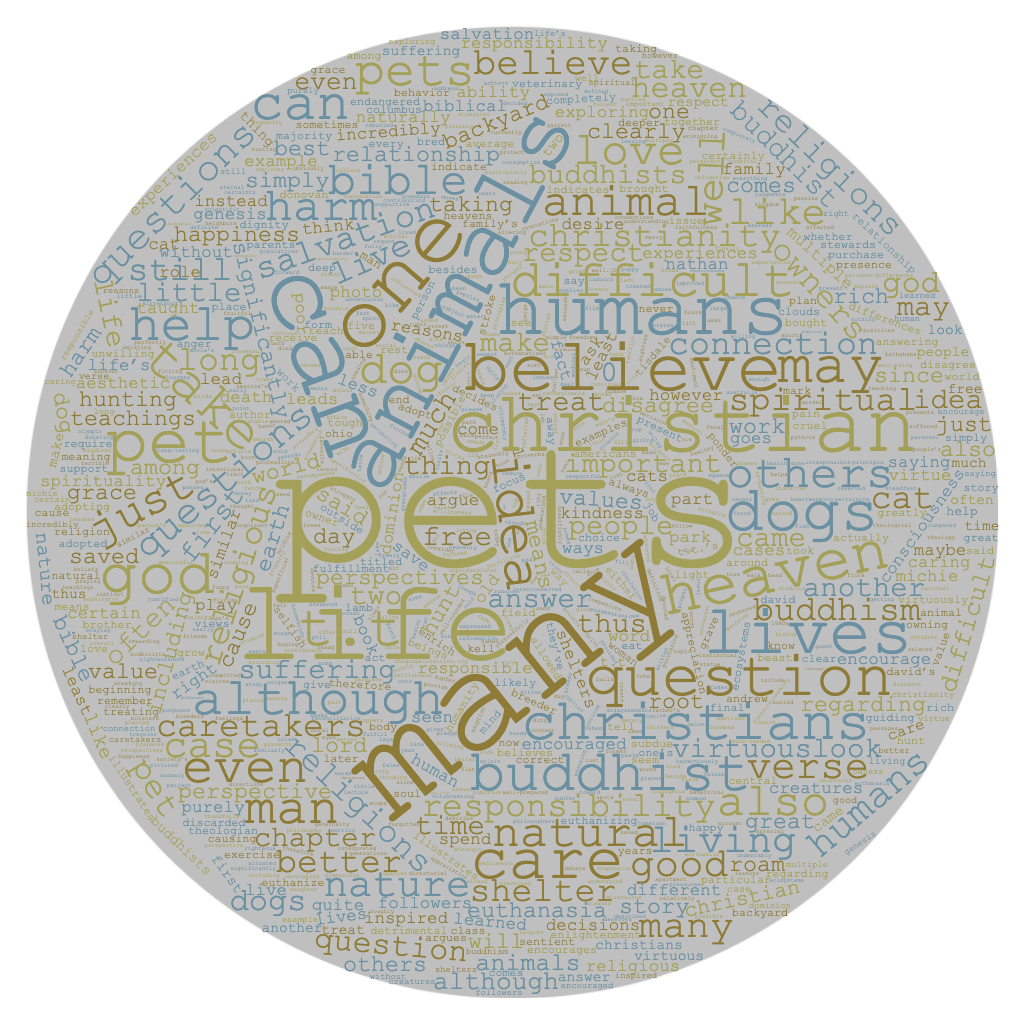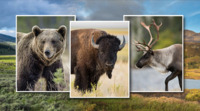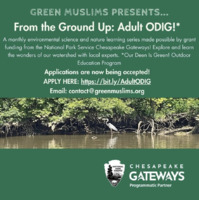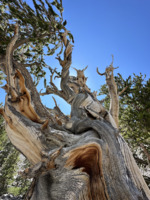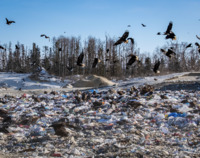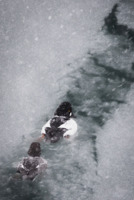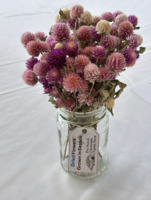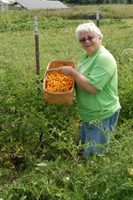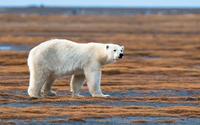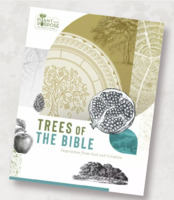Search
33 items
-
Congregational Profile: St Francis of Assisi parish Creation Care Team, Columbus, OH
When St. Francis of Assisi’s Creation Care Team volunteered to take responsibility for caring for the church’s flower and vegetable gardens in the summer of 2018 it faced a challenge: how to dispose of yard waste in a responsible manner. The parish did not have resources to hire a vendor to appropriately dispose of leaves and garden debris and hauling it away in our private cars while possible would take extra time. The Team members did know though that we did not want to continue to toss the yard waste in the trash, which is what had previously been done.
Luckily a solution was at hand: a new member of our parish and our Creation Care Team—Todd Marti-- serves as one of the “garden stewards” at Upper Arlington Lutheran Church’s community garden at Mill Run. Todd volunteered to haul away the yard waste from St. Francis and add it to the compost bins at the community garden. So St. Francis’ yard waste helps grow food that when harvested feeds hungry families through Neighbors (SON) Ministries’ Hilliard Free Lunch Summer Camp for Kids program, the Hilltop, Mid-Ohio Food Bank, and through Faith Mission-- a win for all involved.
-
Engaged Organizations: Stratford Ecological Center
The Stratford Ecological Center is an organic farm and nature preserve that provides education sessions, tours, and hiking trails to the public. They also offer various workshops and classes on an ongoing basis.
Trinity Catholic Elementary School 4th and 5th graders participation each year in a 5-day environmental camp "Messages of the Earth" at the Stratford Ecological Center. -
Engaged Organizations: Black Church Food Security Network
The Black Church Food Security Network strives to provide fresh produce to historically Africa American churches within the Baltimore Metro area. Their popup farm stands provide convenience to the public as they are able to set up during times when congregation members typically gather. Ideally, members will either start their own gardens on site or expand ones that they currently maintain. Often, the farmers or urban growers will offer to lead bible studies and include food security issues as part of the sessions. -
Toledo Grows: Community Supported Agriculture (CSA)
Community Supported Agriculture is run by grassroots organization Toledo Grows. Benefits of being a CSA shareholder include receiving weekly shares of quality, fresh farm products. Shareholders also can choose between a full share (portioned for a family of 3-4 for the week) or a half share (portioned for 1 or 2).
Members support local farmers using sustainable growing methods—no harmful chemicals; receive a variety of vegetables and herbs, including many “staples” such as carrots, lettuce, peppers, onions, etc.—whatever is ready that week; experience new vegetables; and receive recipes and tips on cooking them. -
Profile: Todd Marti
Todd Marti, a parishioner at St. Francis of Assisi Parish in Columbus, serves as a “garden steward” for the community garden located on the grounds of the Upper Arlington Lutheran Church at Mill Run. Todd’s garden stewardship is a clear reflection of his care for creation and his fellow man. Each year vegetables are planted on two-thirds of the 12,500 square feet garden. When the tomatoes, beets, squash, lettuce and other vegetables are harvested they are donated to the Hilliard Free Lunch Summer Camp for Kids, and Mid-Ohio Food Bank partner pantries. On average 10,000 pounds of produce is harvested and donated annually. Over the life of the garden 130,000 plus pounds of produce have been donated. The recipient of the Franklin Park conservatory Growing to Green Gardener of the Year Award in 2012, Todd utilizes innovative gardening practices such as companion planting and sequencing of multiple crops to enhance output. The garden helps preserve God’s creation by composting food waste and coffee grounds from local coffee shops and restaurants. Yard waste is also composed including that generated by St. Francis of Assisi from its flower and vegetable gardens.
When he is not working in the community garden—which he is every Saturday from spring until mid-November--or recruiting volunteers to help with weeding, planting and harvesting, Todd can be found at his day job as an Assistant Attorney General for State of Ohio.
-
All Creation Gives God Praise: An Earth Day Webinar
"Every year, Catholic Climate Covenant produces a one-hour educational program. This year [2019] we are focusing on the issue of protecting biodiversity to complement the Earth Day Network's 'Protect Our Species' campaign. In the webinar we explore why the Earth day Network chose the theme of 'Protecting Our Species' and all the wonderful resources and toolkits that they have available for your use. We also delve into the Covenant's Earth Day program and how you can facilitate a program in your parish, school, or religious community." -
The Case for Animal Spirituality - Part 1: Conceptual Challenges, Methodological Considerations, and the Question of Animal Consciousness
This article, written by Paul Cunningham, explores the case for nonhuman animal spirituality. Spirituality goes beyond language, reflective consciousness, or conceptual thought. Animal spirituality and participation in religious phenomena are growing areas of research at the intersection of animal studies and religious studies, this article is a small but emerging discussion of this subfield. -
The Place of Pets in Our Lives: Some Christian and Buddhist Perspectives
This chapter from the student-written book “Emerging Perspectives on Religion and Environmental Values in America” explores the impact of animals and pets on our environmental values. The author discusses their own experiences with pets as well as religious texts and perspectives as they relate to animals. Below is the first paragraph of the chapter to introduce the discussion.
"If you ask a person to tell you about their favorite pet they’ve had, no matter how long it has been since it lived, their faces will most likely light up with joy as they tell you a humorous or heartwarming story about 'the best cat' or 'the best dog in the world!' Love and appreciation for our pets seems to be a relatively universal trait that, for many of us, is also interconnected with our religious or moral values and feelings toward nature." -
Laudate Deum
"Eight years have passed since I published the Encyclical Letter Laudato Si’, when I wanted to share with all of you, my brothers and sisters of our suffering planet, my heartfelt concerns about the care of our common home. Yet, with the passage of time, I have realized that our responses have not been adequate, while the world in which we live is collapsing and may be nearing the breaking point. In addition to this possibility, it is indubitable that the impact of climate change will increasingly prejudice the lives and families of many persons. We will feel its effects in the areas of healthcare, sources of employment, access to resources, housing, forced migrations, etc.
This is a global social issue and one intimately related to the dignity of human life. The Bishops of the United States have expressed very well this social meaning of our concern about climate change, which goes beyond a merely ecological approach, because 'our care for one another and our care for the earth are intimately bound together. Climate change is one of the principal challenges facing society and the global community. The effects of climate change are borne by the most vulnerable people, whether at home or around the world'. In a few words, the Bishops assembled for the Synod for Amazonia said the same thing: 'Attacks on nature have consequences for people’s lives'. And to express bluntly that this is no longer a secondary or ideological question, but a drama that harms us all, the African bishops stated that climate change makes manifest 'a tragic and striking example of structural sin'.
The reflection and information that we can gather from these past eight years allow us to clarify and complete what we were able to state some time ago. For this reason, and because the situation is now even more pressing, I have wished to share these pages with you." -
EPN Breakfast: Yellowstone to Yukon: Enhancing Rocky Mountain animal migration through remote sensing and international collaboration
"Caribou, grizzly bears, bison, and many more megafauna and countless bird species rely upon a major migration corridor of western North America spanning the Yellowstone-to-Yukon (Y2Y) region. Y2Y extends more than 3,400 kilometers from the Greater Yellowstone Ecosystem in the western United States to the Arctic Circle in the Yukon Territory of Canada. These species are impacted by roads and other human infrastructure developed throughout the corridor.
Enter the Room to Roam: Y2Y Wildlife Movements (Room2Roam) project. Room2Roam is funded through the NASA Ecological Forecasting Program and is accelerating data analysis and coordination to improve wildlife management efforts across borders. With coordination from Ohio State’s Dr. Gil Bohrer and representatives of seven agencies and conservation groups from First Nations, Canadian provinces and territories, and American states, launched this project from Whitehorse, Yukon Territory, in 2022...
With support from Ohio State's Translational Data Analytics Institute (TDAI), join this EPN event to learn more about this incredible research and partnership endeavor, and its implications for land and resource managers in Ohio and beyond."
The event will take place on 2/13/2024 from 7:15 a.m. to noon at Nationwide and Ohio Farm Bureau 4H Center.
The cost is $25 for non-students, $5 for students, and free for virtual participants. -
From the Ground Up: An Adult Outdoor Education Program
AKA Our Deen is Green! for Adults"We are happy to announce that applications are now being accepted for From the Ground Up: An Adult Outdoor Education Program (aka Our Deen is Green! for adults). This special program, funded by a grant from the National Park Service Chesapeake Gateways Office, will begin after Ramadan, in late April 2024, and continue into spring of 2025. It is a unique opportunity to become immersed in the various facets of ecology, environmental science, sustainability and stewardship. It will include monthly classes, mostly in-person and outdoors in parks and wildlife sanctuaries in DC, Maryland, and Northern Virginia, focused on specific aspects of and issues pertaining to our local region, the Chesapeake Bay Watershed.
Classes will be led by local subject matter experts and include a variety of topics, including local plants and animals, the interconnectedness of our watershed, the challenges it’s facing, and what we can do to help. Specific classes will include:
· An introduction to the Chesapeake Bay Watershed
· Local herps: reptiles and amphibians
· Monitoring stream health with benthic macroinvertebrates
· Stream restoration and invasive plant removal
· The importance of native plants and pollinator gardens
· Watershed education through an interfaith lens
· Native trees
· Soil health
· Environmental justice
· Local birds and “bugs”
· Solar power and clean energy
· Sustainable living
· Water-quality monitoring
· And more!
We are looking for 10-15 strongly committed local residents who are interested in learning about our local watershed, its needs, and what they can do to help it. Participants will be encouraged to create a long-term project or plan of action describing something they will do to support the watershed and/or encourage their families or communities to pay more attention to environmental issues.
Program participants must be able to commit to the majority of the monthly classes. All in-person classes will take place on weekends and last 2 to 4 hours. (We will do our best to help provide transportation if necessary.)
This entire program is being offered free of charge thanks to a National Park Service Chesapeake Gateways grant. The National Park Service Chesapeake Gateways Office (NPS Chesapeake Gateways) offers competitive grant opportunities to advance the Chesapeake Bay Initiative Act of 1998 within the full 41-million-acre Chesapeake Bay watershed. Chesapeake Gateways grants bring out familiar, untold, under-appreciated, or yet to be uncovered narratives and promote resilient communities & landscapes through tourism, sustainability, conservation & local economies throughout the Chesapeake Bay watershed.
The program begins after Ramadan, with the introductory class set for April 21st! Applications are due by March 8th. Access the application form below. Please reach out to us at contact@greenmuslims.org with any questions." -
Old Growth
"This photograph shows my view of old growth redwood trees located in the Redwoods National Park. Enjoying nature is an important aspect of sustainability in that it reminds us of our inherent connection to nature, its beauty, and importance." Taken by Kelsey Wolf. Submitted to the Sustainability Photo Contest. -
A Walk with Sustainability…and the Bolivian Llamas
"In this picture, I am working alongside two rural Bolivian community members (and a llama), collaborating on the design of a water system. The community had no running water, phone service only on hills, cut plastic liter bottles in half for gutters, and still gave me soups and meals as a welcoming and thankfulness. Their kindness, harmony with the land around them, and joy radiated, deeply resonating with my idea of how to live a sustainable, happy life. Sustainability is not buying a reusable water bottle…every 3 months because a new, better, more cool version is here. It is living in gratitude and simplicity with the people and nature around you." Taken by Megan Oleksik. Submitted to the RESTORExchange Sustainability Contest. -
Bristlecone Pines
Third Place Winner of the Sustainability Photo Contest.
"Bristlecone pines live hundreds if not 1000 years. They live in one of the most unforgiving landscapes on Earth and yet survive."
Taken by Harrison Frenken. Submitted to the RESTORExchange Sustainability Photo Contest. -
Eagles Feasting at the Landfill
"Eagles feasting at the landfill: This doesn't have to be our future!" Taken by Diego Norena. Submitted to the RESTORExchange Sustainability Photo Contest. -
Ice and Teeming Wildlife
"May the future have ice and teeming wildlife". Taken by Diego Norena. Submitted to the RESTORExchange Sustainability Photo Contest. -
Dried Flowers
"Dried flowers from a local organic farm for a sustainability event in February". Taken by Ellie McLane. Submitted to the RESTORExchange Sustainability Photo Contest. -
God’s Creation Waits
This document is a children's activity book. It discusses topics of different species and environments, showing the importance of each part of our world and connecting it to Christian teachings and values. This includes activities such as crosswords, coloring pages, and much more. -
Buffalo in the Badlands National Park
"I went on a trip to see Mt. Rushmore, however my favorite part was stopping at the Badlands. The badlands is a national park and it is full of wildlife and nature. The best part was seeing the live buffalo out in the wild." Photo taken by Jacob Nichols. -
Shepherd's Corner volunteer opportunities
Shepherd's Corner offers volunteer opportunities for both individuals and groups as indicated on their website:
"Volunteer With Us
Volunteer opportunities at Shepherd’s Corner are as abundant as the fruits of the earth. We invite individuals and groups to share in our ministry of caring for the land. All sorts of skills are needed or come to learn some new ones. One time visits, work on special projects, or regularly scheduled participation are welcome.
Group Projects
Groups are invited for a half day of service on a Tuesday, Wednesday, Thursday, Friday, or Saturday. We ask for one adult per 10 youth under 18 years.
Individual Volunteers
Come for a weekly or monthly time or fill in as needed. Individuals will need to complete our volunteer application. The application is the last to pages of the preceding link. We will ask individuals for background screening since we often have minors present. Volunteers must be age 13 or older; volunteers for animal chores must be age 18 or older." -
The Sierra Club Efforts to Protect Wildlife
The Sierra Club is a nonprofit Environmental organization based in the United States and was created in 1892. Among their many environmental initiatives they plan on conserving wildlife. The Sierra Clubs goal is to protect 30% of the natural world by 2030. Not only will preserving the land wildlife it will also provide people with clean water, clean air, and climate stability. This article describes the Sierra Clubs involvement with Endangered Species Day. -
Columban Center for Advocacy and Outreach
The Columban Center for Advocacy and Outreach (CCAO) was founded in 1985 as the national advocacy office for the Missionary Society of St. Columban in the United States.
CCAO serves as the line of communication between Columban missionaries on the ground and policy-makers in Washington, D.C. Their mission is to work towards a more just, peaceful, and environmentally sustainable world by engaging in the political process guided by our faith and the Gospel. They work for structural change for the poor and marginalized populations Columbans serve around the world. Moreover, they advocate for policies and structures that bring society and the world into the right relationships with all of God’s Creation.
CCAO follows Catholic Social Teaching as their lens to engage in legislative advocacy and community engagement. -
Catholic Social Teaching and Humane Education
"A discussion surrounding the challenges educators, parents, and supporters of animal welfare face in teaching compassion to children.
This event will be held at Fordham Lincoln Center (113 W 60th Street, Manhattan, NY, 10023) for in person folks, with a Zoom option. Specific room information or a Zoom link will be sent out the week prior to the conference." -
Trees of the Bible
"What does the Bible have to say about trees?
A lot, actually. In this guide, we explore nine trees of significance in Scripture to better understand the context of the passages and our relationship with the Creator (of trees and people)." -
Nativities and the Natural World
Housed at the University of Dayton Roesch Library Building, this exhibit is available Nov. 20, 2023 through Jan. 12, 2024.
"Explore the intersection of Christmas and nature through the Marian Library’s Nativity sets, artwork and more. In this exhibit, artists incorporate plants and animals from around the world into the Christmas story. Gourds, straw, wood, mother-of-pearl and beeswax are among the materials used to create Nativity sets that reflect the natural world in which Christ was born."

